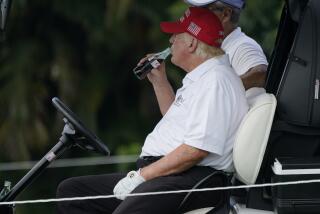Learning to quit smoking
- Share via
“I constantly struggle with it [smoking]. Have I fallen off the wagon sometimes? Yes.”
-- President Obama, June 23, 2009
--
I started smoking when I was 16, pilfering cigarettes from my mother’s purse or swiping unfiltered Pall Malls whenever my dad left his opened pack untended. Then I got a job that summer and began buying my own -- Newports with menthol and filters, a brand preferred by all the young tobacco initiates I had begun to share my habit with.
The rituals of smoking were many, and we adopted them all, along with the identity they gave us, the new sense of ourselves as grown-ups, even if we were faking it, aping our elders as a means of proclaiming our difference from them -- a neat trick.
We’d all strike poses learned from the movies, or practice smooth moves in the art of lighting up. We studied how to flip away a cigarette butt in a gesture of defiant insouciance, or how to cup a cigarette against the wind. We learned how to light one cigarette from another, or to light one from a gas stove without singeing our hair. We taught ourselves how to blow smoke rings.
Some of us made a fashion statement by enfolding a cigarette pack in the sleeve of a T-shirt, and others thought it a mark of adolescent elegance to cock a cigarette behind one’s ear.
We also picked up courting practices that included the touch of a hand as we lighted cigarettes for our girlfriends. We attempted to look sensitive in the way we pulled smoke into our lungs ever so contemplatively, then exhaling slowly, desperately trying to impress.
Those first cigarettes I smoked would lead to a couple hundred thousand more, consumed over more than 30 years, long after any of it seemed cool, and much past the time when smoking was a choice. What began as a desire for acceptance and admission to adulthood became the mark of a pariah, bearing the stamp of loserdom, as smokers huddled near the entrances to our workplaces. We’d take quick drags on our illicit smokes while colleagues exited and entered the buildings with looks of disdain or beleaguered tolerance for our pathetic need.
The arc of American tobacco addiction began during World War I, when doughboys fresh off the farms were given tobacco and rolling papers as part of their ration kits, an explicit government endorsement of a practice that I’m sure killed more of those young soldiers than enemy bullets ever would. My grandfather picked up the habit in uniform and passed it down to me -- as did guys such as Humphrey Bogart and a legion of other actors and writers of my granddad’s generation who enshrined the practice as the hallmark of toughness or sophistication.
Women were taught to smoke largely as a means of weight control (perhaps that benefit is why our president is so elegantly slim). Thousands of ads from the 1920s through the ‘50s promised glamour and trim silhouettes to our grandmothers and mothers. Those ads helped persuade my mom to start smoking before she conceived me when she was 16, by which time she was already a nicotine addict. Even doctors joined in the campaign to get women to smoke, endorsing some brands over others and promising menstrual mood control and suppression of “nerves.”
The social pressure to start smoking is less today than it was in Mom’s day -- or mine -- but, every day, 3,500 Americans under 18 try their first cigarette, and 1,100 make it a habit, according to the American Cancer Society. Some are enticed by flavorings designed to attract the young. The tobacco bill passed last month bans most flavorings, though a political compromise exempted the one -- menthol -- that helped hook me. But overall, giving the federal government new powers to regulate tobacco is a good thing, likely to save lives.
Mark Twain famously said that quitting smoking was easy, that he’d “done it hundreds of times.” I found it equally “easy,” swearing off cancer sticks on an almost daily basis until I finally managed to smoke my last cigarette 15 years ago.
My mother quit a few months ago. It was “easy” for her too. She has lung cancer.


